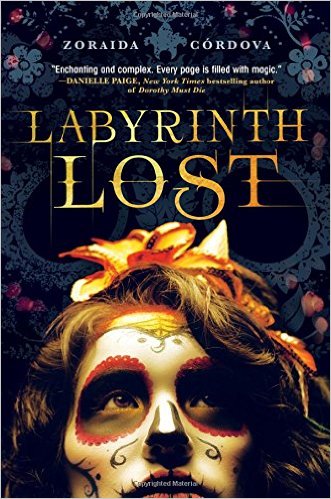Brujas caught my interest for the first time when I actually saw the male version in True Blood (and boy am I glad I actually did research outside of that). But the idea of cultural specific customs, rituals and what not related to magic has always piqued my interest because it demands that we look outside our normal conceptions of how ideas work. I’m a huge fantasy reader and the magic when I was growing up usually went one way. There wasn’t a great deal of variety in the magic systems, the rituals attached to them and who actually got to use this magic. Even today, while things are much better, I have to make active efforts to find books that exist outside these norms. LABYRINTH LOST is such a book and the brujas in it are interesting as hell.
Alex is the main character through which we view the world. She’s not exactly enthused about her powers and is in fact looking out of ways to have them at all. As this is a YA story, it’s not surprising that the main character feels a bit awkward and like a freak amongst their family. But it doesn’t feel rehashed or dry in this story. Her anxiety is actually based in some very real concerns that I think a lot of children in single-parent homes can relate to. She does a lot of growing up in this book which is of course expected in YA, but this maturation feels earned. Alex really does go through some things to come out stronger on the other side.
Lula kind of starts off a bit trope-ish too with the pretty, older, popular sister thing she has going. That particular trope has always made me snarl a little because I’m the oldest and was never any of those things, but that’s just a personal thing. Anyway, Lula definitely defies that trope in some interesting ways. She’s really invested in the bruja way of life and is trying desperately to instill that same kind of belief into her sister. From Alex’s POV, Lula seems well adjusted to things but I don’t think that’s the case. In many single parent homes, you find that the oldest child can sort of take on the secondary parent role. I think Alex has done that and her seeming “ease” with the bruja life is just her trying to step up to the plate and take responsibility where one parent has failed. And you can see how much having to take on that responsibility bothers her in how easily she lashes out at Alex for refusing it.
Alex’s Mom isn’t on the “screen” a whole lot in this book but it doesn’t take much for us to get a full idea of who she is. I see in this woman so many of the single mothers that populate my life. They work tirelessly, love their children endlessly and spend too much time hiding their pain. All of these things are peppered here and there throughout the story, but it makes the Mother such a powerful background figure. The love she has for her children isn’t something that we as the readers have to just assume. It’s put right there on the page for us.
Nova is the bad boy love interest that we have seen so many times in so many different ways. But to this book’s credit a couple of different things are done here. Yes, he’s alluring and attractive but there are some very ugly parts to this guy and the story never lets you forget it. Just when you start to get misty-eyed about him, he does something that reminds you of his complexity and not to just romanticize him. There’s a lot about him to ponder and most important of all, his place at the end of the story isn’t typical to where you see characters like his end up. Definitely towards the end of the book, you can feel the story’s defiance of the trope he would usually represent.
Rishi is the light of this story. She’s really at its heart and is such a breathlessly diverse character. Like she exists and I love it. Her identity unfolds beautifully throughout the text and there’s such a genuine warmth to her. I don’t think the hero’s journey in this book would have carried half as well without Rishi around. She’s beautifully intersectional and I just want more characters like her to flood every YA book. I can hear some screaming “identity politics” in reference to this character, but screw those people. Rishi is exactly what we need more of. She isn’t a bruja but that is precisely what makes her so important to the narrative.
The Devourer is a case of power gone wrong. She’s symbolic of the everlasting need of the powerful to always seek more power. Her corruption is absolute and she seems to be completely aware of this hunger she will always have. But like an addict, she can’t help herself but to want more no matter how much damage it’s doing to her. How timely and fitting is that in today’s present world where we’re having to deal with a President who seems intent on destroying everything around him.
But if this story is any kind of beacon, it’s that even when things seem to be right at their end and there’s nothing good left, hope finds a way. I highly recommend this book and can’t wait for more stories set in this universe.





